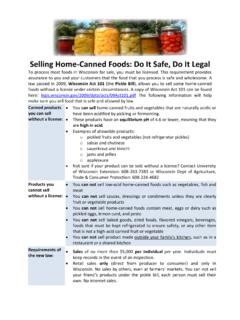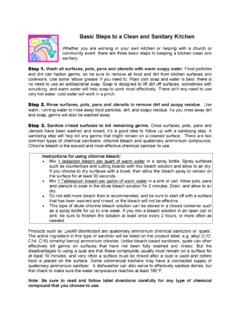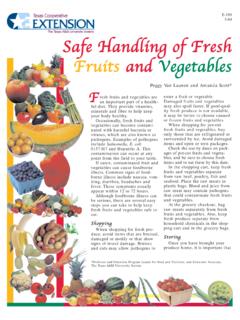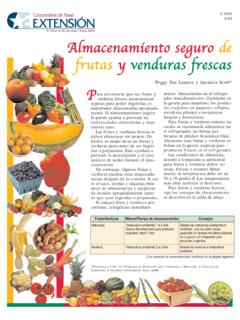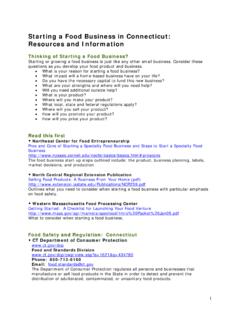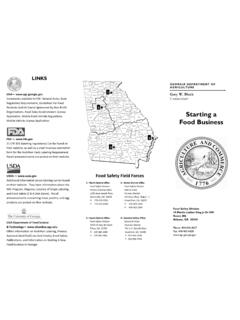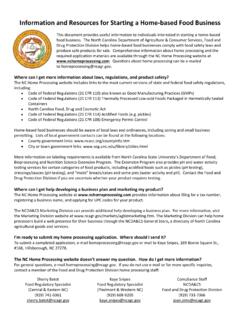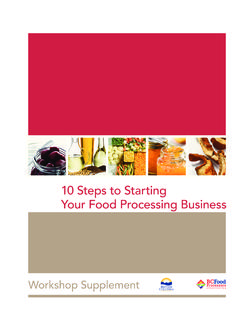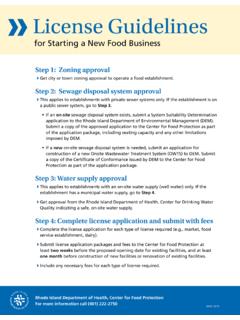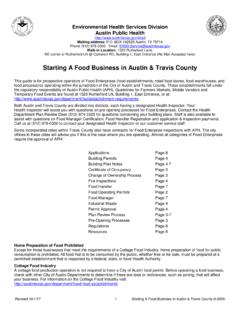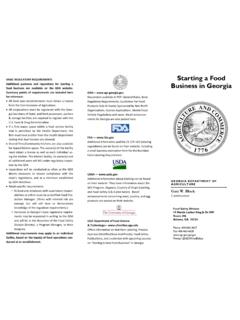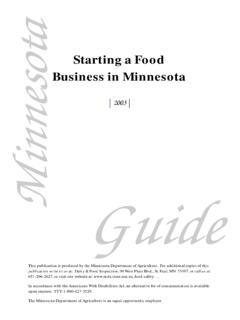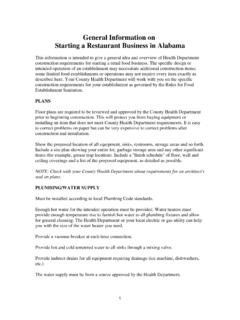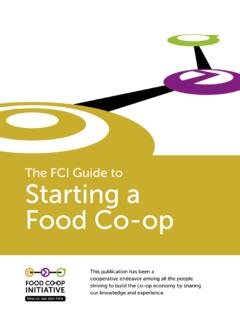Transcription of Starting a Food Business: Canning
1 1 Starting a food business : Canning Canned food is any food in a hermetically-sealed container. A hermetic seal is air-tight. Often we think of canned food as being packaged in a metal can, but the term Canning also applies to food in glass jars, and to some foods packaged in foil or laminate packages. In the state of Wisconsin, if you are processing canned food that you intend to sell wholesale, if the food will be sold outside the state, or if you are notLicensing. A license is required to manufacture and sell many kinds of foods, not just canned food . food manufacturing operations from A-Z require a license, for example: baking, bottling, Canning , coating, cutting, dicing, distilling, drying, extracting, fermenting, freezing, grinding, mixing, pickling, smoking, and stuffing companies involved in all these activities, and many others, must be licensed.
2 Operating under Wisconsin Act 101 (the Pickle Bill exemption), then you must be licensed to process and sell canned food . In order to be issued a license to manufacture food , a processor must identify a location that is acceptable. The requirements of an acceptable facility include adequate lighting and ventilation, work surfaces in good repair, cleanable floors, walls and ceilings, and a safe water supply. A full list of requirements can be found within Wisconsin s administrative code ATCP70: License fee schedule. As long as you are not processing meat or poultry, the operations listed above can be carried out under one license.
3 You are able to bake bread, process jam, and make pickles for sale, all under one license. The cost of a license from the Wisconsin Department of Agriculture, Trade and Consumer Protection (WDATCP) begins at $60 annually for a retail food establishment license, or $90 annually for a food processing plant license (wholesale). This license category allows you to process and sell food with up to $25,000 in sales. As a company s sales increase, the cost of a license increases. Under a license issued by the state of Wisconsin, there is no fee for licensing the processing facility. A license is issued to an individual, an entity, or a corporation, and is not transferrable.
4 A license is issued for processing food at a particular location. Licenses renew each year on March 31st; the fee schedule is not pro-rated for the time remaining in the license year. In some instances, processors may be required to obtain a mobile retail license, a food warehouse license, or other permit as dictated by state, county, or municipal jurisdictions. Check with your food Inspector and the local Chamber of Commerce or public health office for more A license is required to manufacture and sell many kinds of food . In order to be issued a license to manufacture food , a processor must identify a location that is acceptable.
5 Instead of building a facility, a processor just Starting out may find that renting space in a restaurant, a church kitchen, or a community kitchen makes good business sense. 2 information. In addition, businesses need to consider the cost of insurance for their business and other fees. How do I know which type of license I need? A retail food establishment license is issued to processors selling directly to the public from the processing location. A bakery with a sales counter could operate under a retail food establishment license. A food processing plant license, sometimes referred to as a wholesale license, is issued to processors manufacturing food for sale to grocery stores, convenience stores, restaurants, or other retail outlets.
6 Under a wholesale license, you may sell bothMany processors find that renting a facility such as a restaurant kitchen or a community kitchen is the most economical way to get started in the business . All processors renting kitchen space are issued a food processing plant (wholesale) license regardless of the sales outlet. wholesale and retail. For example, a bakery may bake bread for sale at a farmers market and to a local grocery store. This bakery would need a food processing plant (wholesale) license for their operation. All processors who manufacture pickles, salsa and other acidified foods (see ) are issued a food processing plant (wholesale) license regardless of the sales outlet.
7 In some counties, the local health department can serve as an agent of the Wisconsin Department of Agriculture, Trade and Consumer Protection. In this case, the local agent can issue a retail food establishment license on behalf of the state. Local agents may have different requirements from the state and their fee structure may vary. A local agent can not issue a food processing plant license; they can not issue a license to a food processor manufacturing food to be sold wholesale. A local agent can notThe licensing process. A food Inspector from the Wisconsin Department of Agriculture, Trade and Consumer, Protection, or an agent program, will work with you one-on-one to help you get your business started.
8 The inspector will meet with you at your processing location to inspect the facility and review the requirements for licensing. If everything is in order, you may receive a temporary license on the spot. If you do not have everything in order, the inspector will tell you what remains before a license can be issued to you. All food manufacturers are expected to follow Good Manufacturing Practices as outlined in the Code of Federal Regulations, Chapter 21 section 110: issue a license for manufacture of food sold outside the boundaries of the county. When a local agent does not have jurisdiction, the license is issued by the Wisconsin Department of Agriculture, Trade and Consumer Protection.
9 Call 608-224-4682 for answers to your licensing questions. and Wisconsin ATCP70. The Wisconsin Department of Agriculture, Trade and Consumer Protection issues licenses for many food processing operations: Manufacturing foods at a shared-use facility Manufacturing foods for wholesale distribution Manufacturing foods for sale outside a narrow geographic area, outside county boundaries Manufacturing acidified canned foods Call 608-224-4682 for more information 3 There is no charge for the pre-licensing visit(s) under the state licensing program. To meet with a state food inspector, call 608-224-4682 for the contact information of the inspector assigned to your area of the state.
10 Processors of canned foods. There are many types of canned food : fruits, jams and jellies, pickles, salsa, sauces and dressings, and tomatoes. In almost all cases, manufacturing these foods for sale requires that you have a license. For information on the licensing exemption for low-volume, in-state sales of canned fruits or acidified vegetables (the Pickle Bill licensing exemption), see Small processors generally do not have the type of equipment required to safely manufacture for sale low-acid canned foods such as canned meat, seafood or vegetables.



